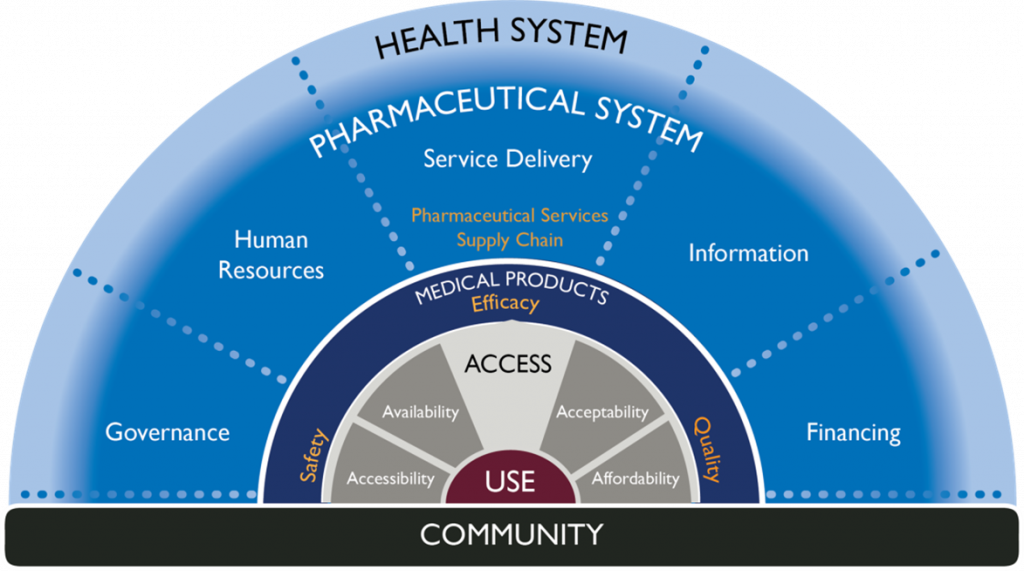Unpacking MTaPS’ Pharmaceutical Systems Strengthening e-Learning Course
By Abibata Handley and Niranjan Konduri, MTaPS
Access to medical products and related pharmaceutical services is critical for good health outcomes and is at the heart of a strong health system. However, challenges persist in low- and middle-income countries (LMICs) that hamper access to quality-assured medicines, which adversely affects treatment for common diseases. These challenges are complex and relate to some of the core functional areas underpinning a pharmaceutical system, including policies, laws, and governance; regulatory systems; financing; human resources; and information availability.
The newly launched USAID Vision for Health System Strengthening 2030 outlines the desired intermediate outcomes of equity, quality, and resource optimization that lead to positive health outcomes. While working to enhance health system quality at all levels, strengthening the pharmaceutical system―including the regulatory system and pharmacy practices―aims to ensure sustainable access to and appropriate use of safe, effective, quality-assured essential medical products and pharmaceutical services. The systems approach emphasizes the appropriate use of the medicines, including antimicrobials, which is critical to containing antimicrobial resistance and protecting global health security.
The Pharmaceutical Systems Strengthening (PSS) 101 e-Learning Course
Building pharmaceutical systems strengthening (PSS) expertise cannot be achieved through a one-time activity. It is an ongoing process that includes intensive training combined with on-the-job practice. Hence, MTaPS designed a competency-based Pharmaceutical Systems Strengthening 101 (PSS 101) course for decision-makers and practitioners, such as public health program planners, managers, implementers, and other global health professionals interested in healthcare delivery functions relating to medicines, vaccines, and other medical products. This adult learning course is designed to accommodate the needs of audiences for both face-to-face training and distance learning and to incrementally build their capacity along the PSS continuum.
Why Take the PSS 101 Course?
A course like the PSS 101 is needed now more than ever. It focuses on the whole system and demonstrates the value of using a system strengthening approach to sustainably address pharmaceutical management problems, which is especially critical in today’s times as LMICs tackle COVID-19 and periodic infectious outbreaks like Ebola and Zika that require resilience in health systems.

Pharmaceutical systems strengthening for better access and use of medical products
Key Features of the PSS 101 Course:
- Offers self-paced learning of complex PSS technical concepts from anywhere at any time
- Comprises eight interactive modules, each identifying and implementing strategies and actions that achieve coordinated improvements in the critical components of a pharmaceutical system
- Exposes participants to information on analyzing, selecting, designing, and implementing interventions, and measuring the intended or unintended effects, with examples of application in LMICs for sustainably improving access to and appropriate use of medicines, diagnostics and health technologies
- Gives a certificate to participants who successfully complete all eight modules and assessment tests
At the end of the course, participants will have a better understanding of how to support countries to strengthen their pharmaceutical systems using the USAID PSS approach, including:
- The relationship between a pharmaceutical system and supply chain management
- How the PSS approach can contribute to sustainable improvements in medicines’ access and use by examining the underlying factors and their linkage to health system functions
- Comparing alternative strategies for interventions, taking into account context and resources, with an introduction to evaluation tools
- Exploring specific pharmaceutical system weaknesses in USAID-supported countries that have an impact on USAID’s health goals.
A Call to Healthcare Professionals, Managers, and Decision-Makers
A strong and resilient pharmaceutical system can help a country ensure access to safe, effective, quality-assured, and affordable essential medicines and vaccines for all, which is needed to achieve universal health coverage, as stated in the UN Sustainable Development Goal Target 3.8. MTaPS invites prospective participants to learn more about the course and enroll to grow professionally and gain cross-cutting PSS expertise to make a greater contribution to improving health care delivery and outcomes.
To take the course, visit the PSS 101 course site.